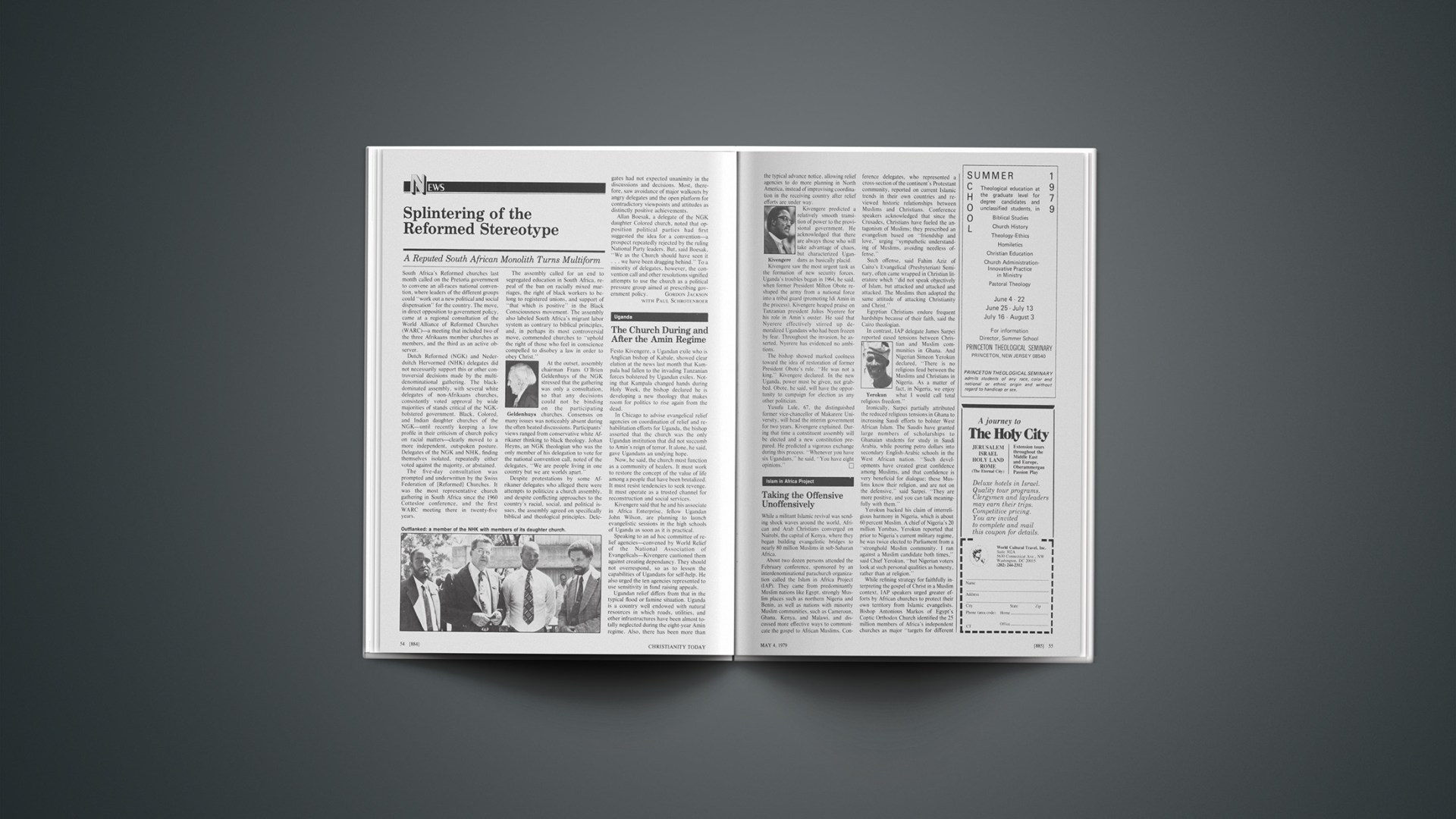While a militant Islamic revival was sending shock waves around the world, African and Arab Christians converged on Nairobi, the capital of Kenya, where they began building evangelistic bridges to nearly 80 million Muslims in sub-Saharan Africa.
About two dozen persons attended the February conference, sponsored by an interdenominational parachurch organization called the Islam in Africa Project (IAP). They came from predominantly Muslim nations like Egypt, strongly Muslim places such as northern Nigeria and Benin, as well as nations with minority Muslim communities, such as Cameroun, Ghana, Kenya, and Malawi, and discussed more effective ways to communicate the gospel to African Muslims. Conference delegates, who represented a cross-section of the continent’s Protestant community, reported on current Islamic trends in their own countries and reviewed historic relationships between Muslims and Christians. Conference speakers acknowledged that since the Crusades, Christians have fueled the antagonism of Muslims; they prescribed an evangelism based on “friendship and love,” urging “sympathetic understanding of Muslims, avoiding needless offense.”
Such offense, said Fahim Aziz of Cairo’s Evangelical (Presbyterian) Seminary, often came wrapped in Christian literature which “did not speak objectively of Islam, but attacked and attacked and attacked. The Muslims then adopted the same attitude of attacking Christianity and Christ.”
Egyptian Christians endure frequent hardships because of their faith, said the Cairo theologian.
In contrast, IAP delegate James Sarpei reported eased tensions between Christian and Muslim communities in Ghana. And Nigerian Simeon Yerokun declared, “There is no religious feud between the Muslims and Christians in Nigeria. As a matter of fact, in Nigeria, we enjoy what I would call total religious freedom.”
Ironically, Sarpei partially attributed the reduced religious tensions in Ghana to increasing Saudi efforts to bolster West African Islam. The Saudis have granted large numbers of scholarships to Ghanaian students for study in Saudi Arabia, while pouring petro dollars into secondary English-Arabic schools in the West African nation. “Such developments have created great confidence among Muslims, and that confidence is very beneficial for dialogue; these Muslims know their religion, and are not on the defensive,” said Sarpei. “They are more positive, and you can talk meaningfully with them.”
Yerokun backed his claim of interreligious harmony in Nigeria, which is about 60 percent Muslim. A chief of Nigeria’s 20 million Yorubas, Yerokun reported that prior to Nigeria’s current military regime, he was twice elected to Parliament from a “stronghold Muslim community. I ran against a Muslim candidate both times,” said Chief Yerokun, “but Nigerian voters look at such personal qualities as honesty, rather than at religion.”
While refining strategy for faithfully interpreting the gospel of Christ in a Muslim context, IAP speakers urged greater efforts by African churches to protect their own territory from Islamic evangelists. Bishop Antonious Markos of Egypt’s Coptic Orthodox Church identified the 25 million members of Africa’s independent churches as major “targets for different ideologies … because they have no real understanding” of Scripture.
Such churches, said Markos, are often approached by persuasive Bible-toting Muslims who initiate a conversation that, Markos said, goes like this:
Muslim: “You see this verse here [Matt. 10:6]? It says Jesus came for the lost sheep of Israel. Are you the lost sheep of Israel?”
Independent pastor (perplexed): “No. We’re not even from Israel!”
Muslim: “You see, Jesus did not come for you.”
Such Islamic evangelists might also come equipped with several versions of the Bible, said Markos. After showing untrained Christian leaders the same verse in different translations with conflicting wording, the Muslim concludes: “As you can see, the Bible you have is false. All these Bibles are different because the real Bible was taken to heaven in the third century.”
Markos said that many independent pastors in rural African churches lack training in Scripture, so that they are highly vulnerable to persuasive and committed Islamic evangelists: “The way Christians in Africa should face Islamic ideology among independent churches is not through confrontation, but through immunizing this weak part of the Christian body.” Bishop Markos, a medical doctor and surgeon, is upgrading biblical training throughout the continent.
Deploring an anemic Christian response to Islam in Africa, outgoing IAP general advisor Peter Ipema declared that “the church has pushed Islam off for thirteen and a half centuries, because it’s such tough territory.” Ipema, who hopes to work with Muslims in the United States, said the church’s minimal outreach to 76 million sub-Saharan Muslims “was primarily due to: a concentration on traditional religionists, who were easier to convert; and a strategy that ignored Muslim beliefs, increasing Islamic suspicion and resentment of Christians.”
During their biennial IAP conference, the delegates confirmed the appointment of James P. Dretke of American’s Lutheran Church—Missouri Synod, as IAP’s new general advisor. “Our goal,” said Dretke, former director of the Muslim Research Center in Pasadena’s U.S. Center for World Mission (Samuel Zwemer Institute), “is to build up trust relationships with Muslims. It gets discouraging to see how slowly Christians are ready to change their approach to Muslims. We become obstacles between ourselves and the outside world.”
IAP is using short-term educational projects, literature, and correspondence courses to train African Christians to share the gospel with Muslims. These Christians share Scriptures that are mutually accepted as divinely inspired by Muslims and Christians. “The final hope,” concluded Chief Yerokun, son of a late Muslim leader in Yoruba land, “is that God, in his infinite mercy, working through Jesus Christ, will let the gospel be spread throughout the length and breadth of Africa.”










